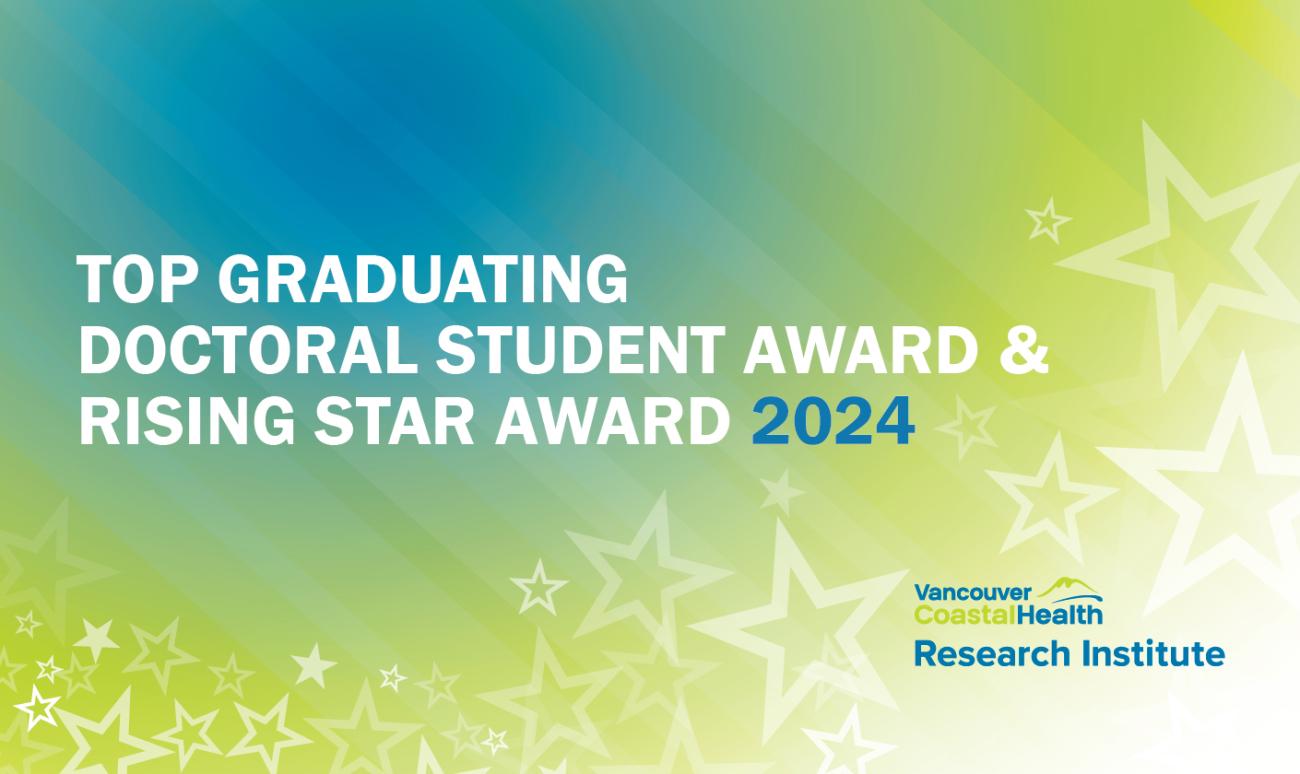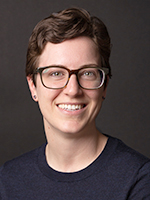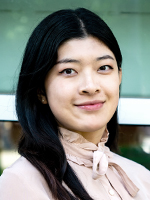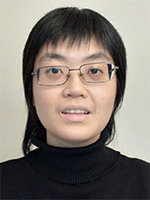
Congratulations to the 2024 Top Doctoral Student and Rising Star Award recipients!
Vancouver Coastal Health Research Institute (VCHRI) is proud to support future research leaders with the Top Graduating Doctoral Student Awards and the Rising Star Awards. These awards recognize the outstanding efforts of VCHRI trainees whose pursuit of research has made them exceptional role models and significant contributors to the Vancouver Coastal Health and University of British Columbia research community.
The 2024 Top Graduating Doctoral Student Award recipients are:
The 2024 Rising Star Award recipients are:
Enhancing personalized prostate cancer treatment with circulating tumor DNA

Award: Top Graduating Doctoral Student
Supervisor: Dr. Alexander Wyatt
Area of research: Prostate cancer
With a strong track record of academic success, including a landmark first-author article in Nature, Cameron Herberts is regarded by his mentors as having unprecedented scientific maturity. His many early-career accomplishments are backed-up by his ability to build meaningful relationships with clinicians, scientists and interdisciplinary collaborators across the globe.
Working in Dr. Alex Wyatt’s lab at the Vancouver Prostate Centre, Herberts explores non-invasive molecular profiling technology using circulating tumor DNA (ctDNA) from blood. This innovative technology may help with selecting therapy better tailored to patient’s individual tumour biology. Herberts has also developed publicly accessible approaches for identifying real-time treatment resistance using ctDNA to understand common resistance mechanisms to new and emerging therapies.
"Genomic testing is now standard practice in oncology, yet significant practical, financial and patient-health constraints preclude use of metastatic tissue biopsy for routine molecular profiling," explains Herberts. “Non-invasive ctDNA testing offers an alternative avenue to study tumor DNA alterations and harbours significant potential to accelerate cancer genomics research and influence clinical decision making.”
Uncovering the link between eye movements and motor skills in stroke recovery

Award: Top Graduating Doctoral Student
Supervisor: Dr. Lara Boyd
Area of research: Stroke rehabilitation
Cristina Rubino strives to improve the quality of life for Canadians. During her PhD, she was honored as a UBC Public Scholar for her efforts to bridge the gap between research and the community. Support from the Public Scholar Initiative empowered her collaboration with non-academic groups to help better integrate patient perspectives into research processes.
With a background in vision neuroscience, Rubino employs advanced techniques, such as magnetic resonance imaging and eye-hand tracking robotics, to investigate the connection between eye movement and arm motor skills in relation to brain structure and function in individuals with stroke.
“My research interests are driven by our limited understanding of how visual impairments impact motor recovery after stroke,” Rubino explains. “My PhD research aims to address this gap, with the potential to increase our understanding of the sources of disability after stroke and provide crucial evidence to further support rehabilitation.”
Examining hand muscle fatigue after spinal cord injury

Award: Rising Star
Supervisor: Dr. Michael Berger
Area of research: Spinal cord injury
A rising star in the spinal cord injury (SCI) community, Christina Whang is enthusiastic about scientific and clinical research. Alongside her collaborations with various investigators, she has also submitted her own first-author publication to the journal Muscle & Nerve and earned first prize for her presentation at the 2023 ICORD Trainee Symposium. Her active engagement in the ICORD Summer Research Program for Indigenous Youth has also positioned her as an outstanding mentor and role model.
By applying muscle stimulation and dynamometry techniques, Whang’s research seeks to understand the major contributors of increased muscle fatigue in the first dorsal interosseous hand muscle — a critical player in hand grip and pinch movement strength that directly impacts the independence and quality of life of SCI patients.
“I am fortunate to be in a lab with knowledgeable and supportive peers who have been pillars of knowledge in my academic pursuits,” says Whang. “By improving our understanding of the physiological mechanisms underlying muscle fatigue after SCI, findings from my research can help guide clinicians in devising more targeted and effective rehabilitation strategies.”
Assessing non-invasive screening methods for endometrial cancer identification

Award: Rising Star
Supervisors: Dr. Aline Talhouk
Area of research: Endometrial cancer
Rachel Woima embodies compassion and dedication in her remarkable pursuit of women+'s health research. Beyond her academic and research achievements, she actively engages with community members, leading outreach events, volunteering at BC Children's Hospital and mentoring undergraduate students and junior research assistants.
Following from the loss of a loved one with uterine cancer, Woima decided to focus her graduate research on early detection tools for endometrial cancer. Her thesis project aims to assess the feasibility and acceptability of non-invasive screening methods for identifying individuals at elevated risk of endometrial cancer. Early detection through these methods could lead to better outcomes, along with improved access to screening and interventions.
“My research in women+’s health focuses largely on the investigation of endometrial cancer risk stratification tools through clinical trial work, which provides insight into endometrial cancer screening barriers,” states Woima. “Studying the integration of screening tools into the health care system could lead to early diagnosis and improved outcomes for those at high risk for endometrial cancer.”
Exploring the benefits of videos for people with advanced stages of dementia

Award: Rising Star
Supervisors: Dr. Lillian Hung
Area of research: Dementia
Karen Lok Yi Wong gained valuable insights from working with older adults as a registered social worker in various settings. Her leadership and collaborative approach has fostered a community of learning among students. She has also received numerous prestigious grants and awards for her work, including a 2023 Knowledge Translation Student Award from the National Collaborating Centres for Public Health and a 2024 Distinguished Service Award from Canadian Association of Social Workers.
Driven by a passion for accessible technology, Wong’s research focuses on the benefits of dementia-friendly videos for individuals in the later stages of dementia. Working with patients and family members with lived experiences, Wong has demonstrated that dementia-friendly videos offer comfort, promote inclusion, facilitate daily activities and evoke memories of past identities.
“I use my research to bring positive changes through knowledge translation, such as moving my research into clinical practice and policy advocacy,” says Wong. “Looking ahead, my research team members and I will expand on our investigations to people from cultural and language minorities to reflect the diversity of the Vancouver population.”
Analyzing pelvic floor muscle training-related changes in individuals with spinal cord injury

Award: Rising Star
Supervisors: Dr. Tania Lam and Dr. Jean-Sébastien Blouin
Area of research: Spinal cord injury
The professional development lead for the VCHRI Trainee Committee and the community outreach lead for the ICORD Trainee Committee, Xueqing Zhou is keen about promoting science communication and collaboration. Motivated by her desire to have a positive impact on individuals with lived experience, her advocacy efforts have allowed her to nurture meaningful connections within the SCI community, as well as cultivate skills in knowledge translation.
For her research, Zhou explores the use of pelvic floor muscle training (PFMT) to alleviate urinary dysfunction in people with partial paralysis due to SCI. Her research involves developing PFMT outcome assessment measures to evaluate connections between PFMT practices, nervous system function and bladder outcomes in this population.
“Working with people with lived experience is a powerful and meaningful motivator for my research,” says Zhou. “Ultimately, my research aims to improve their quality of life.”


